
| NYWI HOME PAGE | VISITING WRITERS & EVENTS INDEX | VIDEO ARCHIVES |
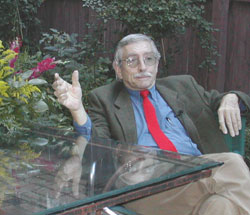 |
American Playwright
NYS Writers Institute, October 2, 2001
8:00 p.m. Reading | Main Theatre, Performing Arts Center
PROFILE
American playwright Edward Albee is one of the leading dramatists of his generation. Much of his most characteristic work is an absurdist commentary on American life. Who's Afraid of Virginia Woolf (1962, film 1966), generally regarded as his finest play, presents an all-night drinking bout in which a middle-aged professor and his wife verbally lacerate each other in brilliant colloquial language. Albee has won three Pulitzer Prizes for A Delicate Balance (1967), Seascape (1975), and Three Tall Women (1994) and two Tony Awards (Who's Afraid of Virginia Woolf? and A Delicate Balance). Albee's most recent work is The Play About the Baby, written in 1998 but making its New York City debut in January 2001. The play earned Albee another Pulitzer Prize nomination and is set in an abstract Eden populated by two characters named "Boy" and "Girl" who are very much in love. Their Paradise is ruined, however, by the arrival of a mean-spirited older couple--"Man" and "Woman."
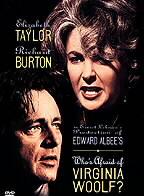 ". . .an absurd meditation on marriage, trust and fertility. . .one of Albee's best works, a zany and sad reflection on life and theater." - Donald Lyons of The New York Post
". . .an absurd meditation on marriage, trust and fertility. . .one of Albee's best works, a zany and sad reflection on life and theater." - Donald Lyons of The New York Post
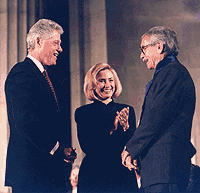 In 1996, he received a Kennedy Center Lifetime Achievement Award and in 1997 he was awarded the National Medal of Arts by President Clinton. At the Kennedy Center Honors Ceremony in 1996, Albee was praised for his impact on American drama.
In 1996, he received a Kennedy Center Lifetime Achievement Award and in 1997 he was awarded the National Medal of Arts by President Clinton. At the Kennedy Center Honors Ceremony in 1996, Albee was praised for his impact on American drama.
Albee was raised as the adopted child of the late Reed and Frances Albee, heirs to the fortune of multi-millionaire theatre manager Edward Franklin Albee. The future playwright attended numerous stage productions while still in kindergarten, and began writing poetry, plays and even novels before adolescence. At the age of 18, Albee was evicted by his adoptive mother from her house and removed from her will because of his homosexuality. Albee explores his feelings about Frances Albee in Three Tall Women, a play that he described in an interview with the New York Times as "a kind of exorcism."
PLAYS BY EDWARD ALBEE (in order of composition)AWARDS (among others):The Zoo Story (drama) 1958
The Death of Bessie Smith (drama) 1959
Fam and Yam (drama) 1959
The Sandbox (drama) 1959
The American Dream (drama) 1960
Bartleby [adaptor; from the short story "Bartleby, the Scrivener: A Story of Wall-Street" by Herman Melville] (opera) 1961 Who's Afraid of Virginia Woolf? (drama) 1961/2
The Ballad of the Sad Cafe [adaptor; from the novella by Carson McCullers] (drama) 1963
Tiny Alice (drama) 1964
Malcolm [adapted from the novel by James Purdy] (drama) 1965
A Delicate Balance (drama) 1966
Everything in the Garden [adapted from the drama by Giles Cooper] (drama) 1967
Box (drama) 1968
Quotations from Chairman Mao Tse-Tung (drama) 1968
All Over (drama) 1971
Seascape (drama) 1974
Listening; A Chamber Play (drama) 1975 (first produced as a radio play)
Counting the Ways; A Vaudeville (drama) 1976
The Lady from Dubuque (drama) 1977/9
Lolita [adapted from the novel by Vladimir Nabokov] (drama) 1970
Finding the Sun (drama) 1982
The Man Who Had Three Arms (drama) 1981
Marriage Play (drama) 1986/7
Three Tall Women (drama) 1990/1
The Lorca Story; Scenes from a Life (drama) 1992
Fragments; A Concerto Grosso (drama) 1993
The Play About the Baby (drama) 1996
The Goat, Or, Who is Sylvia? (drama) 2000
Member of:1960 The Vernon Rice Award for THE ZOO STORY
1961 Foreign Press Association Award for THE AMERICAN DREAM
1963 Tony Award and Drama Critics Circle Award for WHO'S AFRAID OF VIRGINIA WOOLF?
1966 The Pulitzer Prize for A DELICATE BALANCE
1975 The Pulitzer Prize for SEASCAPE
1980 Gold Medal in Drama from Academy and Institute of Arts and Letters
1994 The Pulitzer Prize, Drama Critics Circle Award, Lucille Lortel Award, London Evening Standard Award, and Outer Critics Circle Award for THREE TALL WOMEN
1994 Obie Award for Sustained Achievement in Theatre
1996 Tony A ward, Best Revival of a Play, A DELICATE BALANCE, Lincoln Center Theatre Broadway revival
1996 Kennedy Center Honors
1996 National Medal of Arts
The Dramatists Guild Council
The American Academy of Arts and Letters
President, The Edward F. Albee Foundation, Inc.
According to the famous dramatist, The Play About the Baby is largely about itself. "No two people will see the same play," Albee said. "It is about a real baby who by the end of the play ceases to exist. It is about what happens during the course of the event. I think it's perfectly straightforward and simple. I can't really talk about what it means what the audience is going to get. It's a chamber play. It's a little experimental in the sense that it does some things, which your average Broadway audience doesn't want."
Books by Edward Albee:
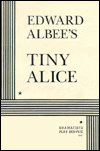
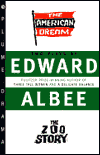
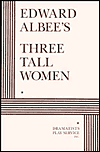
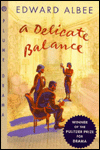
For additional information, contact the Writers Institute at 518-442-5620 or online at https://www.albany.edu/writers-inst.